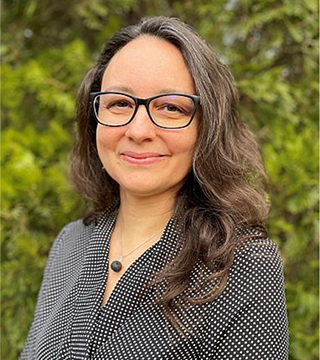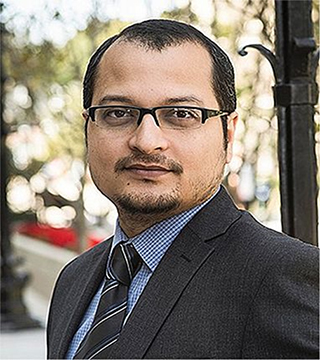By Lee Cannon
Members of the NIH Climate and Health Scholars inaugural class have begun their year-long appointments with eight NIH institutes. During the program, each scholar will contribute expertise to building NIH's climate change research, training, and policy capabilities.
The Climate and Health Scholars Program is part of the Climate Change and Health Initiative, an NIH-wide effort to accelerate research on climate change and health. The initiative's overarching goals are to improve understanding of how climate change affects health and to design successful interventions.
Scholars, working with an NIH host, will lend their expertise toward the initiative's core elements - climate change health effects research, health equity, intervention science, and training and capacity building - and its Strategic Framework objectives. The scholars will present their research to audiences across NIH.
The cohort of the NIH Climate and Health Scholars Program includes:
- Luis Fernando Chaves, Ph.D., an associate professor in the Department of Environmental and Occupational Health in the Indiana University Bloomington School of Public Health. He will lend his expertise in disease-bearing insect ecology to his NIH host, the National Institute of Allergy and Infectious Diseases.
- Lauren Clay, Ph.D., an associate professor in the Department of Emergency Health Services at the University of Maryland, Baltimore County, where she also serves as department chair. She brings her knowledge of individual, household, and community health impacts of climate disasters to her NIH host, the National Institute on Minority Health and Health Disparities.
- Ferdouz Cochran, Ph.D., a Climate-Health Science lead in the Health Innovation Center at MITRE Labs. She offers her experience in holistic approaches to reducing adverse and disproportionate health impacts from climate change to her NIH host, the National Institute of Environmental Health Sciences (NIEHS).
- Zhen Cong, Ph.D., a professor of environmental health sciences at the University of Alabama at Birmingham School of Public Health. She will offer her knowledge of the social and health disparities that older adults and racial and ethnic minority groups experience when faced with natural or human-caused disasters to her NIH host, the National Institute on Aging.
- Carina Gronlund, Ph.D., a research assistant professor at the Survey Research Center in the Institute for Social Research at the University of Michigan School of Public Health. She will bring her expertise in environmental epidemiology and experience in clinical research, survey design and analysis, quantitative health impact assessment, and community-based participatory research to her NIH host, the National Heart, Lung, and Blood Institute.
- Praveen Kumar, Ph.D., an assistant professor in the Boston College School of Social Work. He focuses on analyzing methods to improve health and well-being among populations vulnerable to climate impacts. He will bring his large-scale data analysis approach to his NIH host, the Fogarty International Center (FIC).
- Patrice K. Nicholas, D.N.Sc., D.H.L. (Hon.), a distinguished teaching professor and director of the Center for Climate Change, Climate Justice, and Health at the Massachusetts General Hospital Institute of Health Professions. She will offer her knowledge of global health issues - such as HIV/AIDS care, research, and symptom management; quality of life in chronic illness; climate justice; and more - to her NIH host, the National Institute of Nursing Research.
- Leticia Nogueira, Ph.D., a senior principal scientist at the American Cancer Society. She will contribute her expertise in cancer disparities, especially those related to climate change and structural racism, to her NIH host, the National Cancer Institute.
Two of the scholars, Ferdouz Cochran and Praveen Kumar, bring an international perspective on climate-change impacts to their NIH hosts. Their expertise on how communities in low-and-middle-income countries experience climate effects positions them to illuminate climate equity considerations.
Zooming In on Climate Change and Health from Above

Ferdouz Cochran, Ph.D., is a climate-health science lead at the nonprofit MITRE Corporation. With her background in geography and remote sensing and her experience collaborating with local and national researchers, decision-makers, and Indigenous experts, Cochran has cultivated a unique perspective on climate change's global and local effects.
Cochran spent part of her childhood on a boat with her father, navigating rivers of the Amazon Basin in Brazil. She learned about how weather, disease, poverty, food scarcity, and other factors impact people, especially in disproportionately affected Indigenous communities. Her experiences on the rivers inspired her to pursue studies in geography, then move into a career focusing on the impacts of climate change.
As a National Science Foundation fellow during graduate school at the University of Kansas, she worked for a science and technology center that measured ice sheets using remote sensing, then turned to monitoring carbon fluxes and their impacts on agriculture and Indigenous livelihoods in Brazil. She completed a postdoctoral program working on tools for sustainability and environmental health decision-making at the U.S. Environmental Protection Agency.
At the Carolinas Integrated Sciences and Assessments program, Cochran helped combine climate change science and environmental public health, moving her career toward the intersection of the two fields. As a Climate and Health Scholar, Cochran will explore challenges of, and opportunities for, integrating climate data with population studies. She will pay special attention to groups experiencing disproportionate impacts of climate change.
"We selected Dr. Cochran based on her training as a geographer, experience using geospatial climate data, and commitment to climate-related health disparities," said Kaitlyn Lawrence, Ph.D., a staff scientist and one of Cochran's hosts at NIEHS. "Collaborating with Dr. Cochran will allow us to use an interdisciplinary approach integrating geographic and epidemiologic methods to better study health impacts related to climate change."
Cochran is excited for a behind-the-scenes look at research across NIH. She is also eager to dive into collaborations with her hosts in the NIEHS Chronic Disease Epidemiology Group and with her fellow Climate and Health Scholars.
"I'm a strong believer in team science," Cochran says. "That's the benefit of the Scholars Program: The more of us who put our heads together and consider equity, the more we can move toward real solutions to climate impacts."
In the future, she looks forward to leveraging her new connections within the NIH to make an even broader impact on climate-change issues. Since she has focused on climate issues in the U.S. exclusively for a few years, in the future she hopes to expand her climate and health work to an international scale.
An Evidence-Based and System Science Perspective on Individual-Level Climate Impacts

Praveen Kumar, Ph.D., is an assistant professor at the Boston College School of Social Work. His social science and data analysis work rests at the intersection of climate and environmental justice. He focuses on how climate and environmental injustices affect the health and well-being of disproportionately affected communities in low-and-middle-income countries, particularly in South Asia and Sub-Saharan Africa.
Kumar's research background includes work on the environmental, health, and justice angles of cookstove use. Roughly half the world's population cooks on traditional stoves that burn wood or other biomass fuels . Growing up in a rural area in the state of Bihar in India, Kumar witnessed firsthand the unequal health effects of wood-burning cookstoves.
Women and children, who spend their days close to cookstoves, are particularly vulnerable to the health effects of cookstove use. Household air pollution sits at the intersection of numerous challenges, including energy access for low-income people, climate action, and gender empowerment, among others.
Revealing Climate Drivers of Labor Migration
Praveen Kumar, Ph.D., is no stranger to ambitious international research projects. Before joining the Scholars program, he received a grant from the International Growth Centre, based at the London School of Economics and Political Science, to examine the health and well-being of low-income workers in the brickmaking industry in Dhaka, Bangladesh. Brick kilns generate about 30% to 50% of the particulate matter air pollution in nearby cities , and workers are exposed to high levels of pollution without adequate access to health-protective safety equipment.
Kumar will also explore how climate-led internal displacement contributes to the challenges brick kiln workers face. For example, climate-driven sea level rise increasingly causes saltwater flooding in Bangladesh's coastal farmland, leaving fields too salty to grow crops. Their livelihoods lost, rural farmers move into the city and accept low-skilled jobs, such as those in brick kilns, to support themselves and their families.
With his new project, Kumar will travel to Dhaka to collect data to gain a holistic understanding of challenges facing brick kiln workers, and how climate change affected their situation.
As a Climate and Health Scholar, Kumar hopes to work with colleagues at the NIH Fogarty International Center to collect and publish studies showing what other countries are doing to combat climate stressors.
"I am especially interested in exploring community-based adaptation strategies that impact the health and well-being of climate-vulnerable populations. This is an emerging area of study and needs more traction. By soliciting case studies from practitioners and researchers from low-and-middle-income countries, we will be giving voices to these researchers, so there is more cross-fertilization of ideas," Kumar explains.
Joshua Rosenthal, Ph.D., is a senior scientist at the Fogarty International Center and Kumar's NIH ambassador, or host.
"We are excited to have Dr. Kumar with us. Praveen brings a unique combination of qualitative methods in social sciences - which are needed for understanding local community needs and priorities in low-and-middle-income countries - and quantitative analytical skills to help integrate these into a more generalizable understanding of climate and health," Rosenthal says.
Kumar looks forward to offering his data analytics and systems sciences expertise, particularly social network analysis, to the Fogarty International Center's work addressing emerging global challenges at the intersections of climate and health. He believes social network analysis - analyzing the ways people interact with other members of their communities and how the social networks they form affect their behavior - will give his FIC colleagues a new way to track how climate impacts ripple through communities. He also aspires to explore the possibility of a joint project with his fellow 2023 Climate and Health Scholars, thereby developing a trans-disciplinary initiative responding to the wider NIH Climate Change and Health Strategic Framework.


